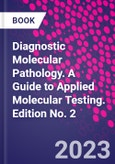Diagnostic Molecular Pathology: A Guide to Applied Molecular Testing, Second Edition assembles a group of experts to discuss the molecular basis and mechanisms of major human diseases and disease processes and how the molecular features of disease can be harnessed to develop practical molecular tests for disease detection, diagnosis and prognosis. The book explains how molecular tests are utilized in the treatment of patients in personalized medicine, highlights new technologies and approaches of applied molecular pathology, and discusses how this discovery-based research yields new and useful biomarkers and tests.
As it is essential to stay up-to-date on new molecular diagnostics in this changing field, this book covers critically important areas in the practice of personalized medicine and reflects our understanding of the pathology, pathogenesis and pathophysiology of human disease.
Please Note: This is an On Demand product, delivery may take up to 11 working days after payment has been received.
Table of Contents
Section 1
Introduction to Molecular Testing
1. Introduction to Molecular Testing in Human Disease
2. The Polymerase Chain Reaction and Other Amplification Methodologies
3. Whole-exome and Whole Genome Sequencing in the Molecular Diagnostic Laboratory
4. Long-read Sequencing
Section 2
Molecular Testing in Infectious Disease
5. Molecular Testing for Human Immunodeficiency Virus
6. Molecular Testing in Hepatitis Virus-related Disease
7. Molecular Testing for Human Papilloma Viruses
8. Molecular Testing for Parvoviruses
9. Molecular Testing for Polyomaviruses
10. Molecular Testing for Respiratory Viruses
11. Molecular Testing for Diseases Associated with Bacterial Infection
12. Agents Associated with Sexually-transmitted Infections
13. Molecular Methods for Healthcare-Acquired Infections
14. Molecular Testing in Emerging Infectious Diseases
15. Molecular and Serological Testing in the Setting of a Global Pandemic
Section 3
Molecular Testing in Genetic Disease
16. Non-invasive Prenatal Screening (NIPS) for Fetal Aneuploidies
17. Molecular Testing in Cardiomyopathies
18. Molecular Diagnostics for Coagulopathies
19. Molecular Diagnosis of Cystic Fibrosis
20. Molecular Testing in Hemochromatosis
21. Molecular Testing for Spinal Muscular Atrophy
22. Molecular Testing for Autism Spectrum Disorders
Section 4
Molecular Testing in Oncology
23. Molecular Testing in Breast Cancer
24. Molecular Testing in Lung Cancer
25. Molecular Testing in Colorectal Cancer
26. Molecular Pathology and Testing in Melanocytic Tumors
27. Molecular Testing for Glioblastoma
28. Molecular Testing in Pancreatic Cancer
29. Molecular Testing in Gynecologic Cancer
30. The Emerging Genetic Landscape in Renal Cell Carcinoma
31. Molecular Testing in Thyroid Cancer
32. Molecular Testing for Pediatric Cancers
33. Molecular Pathogenesis of Soft Tissue and Bone Tumors
34. Molecular Pathology of Gastrointestinal Stromal Tumors
35. Molecular Pathology of Liver Cancer
Section 5
Molecular Testing in Hematopathology
36. Molecular Testing in Myeloproliferative Neoplasms
37. Molecular Testing in Myelodysplastic Syndromes
38. Molecular Testing in Acute Myeloid Leukemia
39. Molecular Testing in the Assessment of Bone Marrow Transplant Engraftment
Section 6
Molecular Testing in Personalized Medicine
40. Pharmacogenomics in Cardiovascular Disease
41. Personalized Medicine for Disorders of Hemostasis and Thrombosis
42. Personalized Medicine in Cancer Treatment
Section 7
The Future of Molecular Testing
43. Imaging Mass Spectroscopy in Clinical Pathology
44. Artificial Intelligence and Deep Learning in Molecular Testing
45. Nanotechnology in Molecular Diagnostics
46. Chip-based Nanotechnology in the Molecular Pathology Laboratory and Beyond
47. Translational and Clinical Applications of the GeoMx� Digital Spatial Profiling Platform








